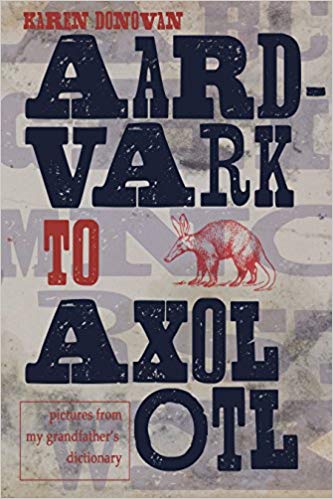
by Ashley McGreary
Opening any collection of short fiction is like losing your senses to a curio cabinet of wonder, but Karen Donovan’s Aard-vark to Axolotl (Etruscan Press, April 2018) takes this precept to an almost literal interpretation. Based on a set of illustrations from the pages of her grandfather’s 1925 Webster’s New International Dictionary, this series of seventy-eight micro stories and prose poems represents an eclectic, lyrical, razor-sharp foray into the sphere of alternative definition, with its true allegiance laying somewhere between a lexicon and a bestiary. Like any cabinet of curiosity, each piece can be taken out, examined separately, and weighed in the humid cup of your hand, yet despite this microcosmic intimacy, its sheer breathless scope means that its fascination can never truly be exhausted. Karan Donovan is also the author of two collections of poetry: Fugitive Red, which won the Juniper Prize, and Your Enzymes Are Calling the Ancients, winner of the Lexi Rudnitsky Editor’s Choice Award. Her recognizant contribution to literature is summed up in Ander Manson’s words: “This blurb won’t help save you, but Aard-vark to Axolotl just might.”
Logically, for a work whose title celebrates the kingdom Animalia, this series begins by examining the complex interrelationships between humans and animals, with its opening gambit: “Earth Pig” rendering our hypocrisies in blood across the page, while equally evoking a psychological proximity that makes the rationalized violence of the piece truly jarring. In a wonderfully postmodern inscription, the titular Aard-vark greet the possibilities of a new day, which include the chance of its own individual extinction, a fact that resonates across all life. This state of interconnection is further advanced in “A Lustrous, Pearly Interior,” which uses the backdrop of a beach, and its calcium carbonate substrate of history, to evince a deep sense of isolation and meaninglessness, against which even language itself is impuissant. The animal and human condition run together like an agate seam through this chapbook, creating a sense of lineage and inheritance that is echoed in the distant-but-still-touching experiences of grandfather and granddaughter. At its heart, this work attempts to define not just the physicality of an object: “Achene of Buttercup in vertical section, showing solitary seed,” but its abstract, metaphysical properties: “When she left, she folded her wasted body through a crack in space-time and bloomed out on the other side, pulling the long bright skein of my brain’s neural pathways with her.” It is a tour de force, which transcribes the dictionary into emotion.
Each micro-piece is accompanied by an original illustration, which acts like a holdfast in the oceanic possibility of language. Beside it, Donovan’s hyper-condensed prose spans a universe in form and tone, rendering each piece with a unique, imperishable signature. From the numbered diagram of “View From Southwest Airliner on Final Approach to Province,” to the jazz-like call and response of “Constraints Are Better Than Freedom,” and the self-depreciating, staccato sentences of “Makeover,” to the nested involvement of “Dinner Date’s” twenty-seven words, Aard-vark to Axolotl explores ideas of perspective, interpretation, pleasure and disappointment, creativity, ineffability, and the condition of being untethered from ones culture: in short, everything it means to be human.
The collection also focuses its lens on the darker side of the human experience too, with sequences such as “Burn Notice” depicting a spiralling lack of control, which unwinds from a superficial sunburn to “The towers and with them my psyche. My bridges ever since,” articulating an irretrievable state of entropy; and “Sales Job,” whose jaunty tone hides a tenebrous scepticism concerning our inability to escape the corporate order and its false-benign smile.
Parallel to the natural world in Aard-vark to Axolotl is the urban environment, and the efficiency or redundancy of technology, with “No Signal Detected” and “The Accident” offering rival perspectives. In the first micro-piece, a couple resist the tide of progress by persevering with their old “rabbit ears” aerial and its temperamental reception; after far too long of this, they finally buy a smart, new antennae, which, like their old one only works when it is “propped up at exactly the right angle over in the corner of the room on top of the CD player,” showing the cynical failure of technology to improve anything other than material aesthetics. The second micro-piece, comparatively, advocates the propensity of technology to remake life as secure and perfectible through the illusion of depth. Following a jarring cycling accident, the speaker trades the risk of reality for “the stationary bike at the Y, the one that’s like a videogame” and is satisfied with the substitution, a stance which challenges our own perspectives on modernity. Donovan’s collection is, indisputably, a work of and for our time, but it also represents a pantheon across all times, with its tendrils trailing between past, present, and future. The existential resonance in “Mesozoic’s” line: “Ask the experts where my bones lie: there, on the other side of catastrophe,” implicates both the fragility and endurance of life, and the ease with which all animation passes into history; while “Other Floral Borders I Have Known” paints a cradle to grave montage through the adornment of flowers, capturing the essence of existence as beautiful, fading, and brief.
To return, punctually, to the curio cabinet metaphor, it is impossible to appreciate everything in Donovan’s work through a single encounter, Aard-vark to Axolotl is a collection that not only stands up to a third, fourth, fifth reading, but actively encourages it. With a tone that shifts from lyrical, to scathing, deprecating, eccentric, empowering and introspective, this collection provides, at its core, a rumination on how we use language to construct and define the world around us, as well as the place of writing within that structure. “It was then I understood,” Donovan records, in conjunction to the etching of an Archer Fish, “I had a razor-tipped device inside me that could spear any prey I desired.” The rest, they say, is history, because the power of good writing has been hooking people ever since. Though most readers don’t prefer a comparison to fish.
____________________________________________
 Ashley McGreary is a fledgling writer with a degree in English and Creative Writing, currently working towards an MA in English Literature. She is at the extreme end of starting out, but hopes eventually to shape a career out of the two things that set her soul on fire: literature and writing.
Ashley McGreary is a fledgling writer with a degree in English and Creative Writing, currently working towards an MA in English Literature. She is at the extreme end of starting out, but hopes eventually to shape a career out of the two things that set her soul on fire: literature and writing.

 The core workshop of SmokeLong Fitness is all in writing, so you can take part from anywhere at anytime. We are excited about creating a supportive, consistent and structured environment for flash writers to work on their craft in a community. We are thrilled and proud to say that our workshop participants have won, placed, or been listed in every major flash competition. Community works.
The core workshop of SmokeLong Fitness is all in writing, so you can take part from anywhere at anytime. We are excited about creating a supportive, consistent and structured environment for flash writers to work on their craft in a community. We are thrilled and proud to say that our workshop participants have won, placed, or been listed in every major flash competition. Community works.